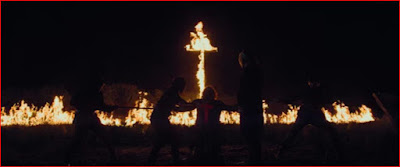Gareth Evans, the director of the Raid movies, arguably the best martial-arts films of the 21st century so far, returned to his native Wales to make an action-horror period piece set in Edwardian England. It starts slow, introducing us to former missionary Thomas Richardson (Dan Stevens), who infiltrates a Welsh island that's been taken over by a religious cult. The cult, which has scriptures of its own and a putatively charismatic leader in Malcolm (Michael Sheen), has kidnapped Richardson's sister and is holding her for ransom. They've been reduced to that because a once-flourishing community has seen harvests fail, but some cult members believe that even more extreme measures are necessary to revive the crops.
Probably because Evans is more interested in the fantastic horrors to be revealed later, Apostle makes it hard to believe that Malcolm's cult could attract as many people as it seems to. As Malcolm, Sheen simply isn't that charismatic, and we see pretty much nothing to explain the cult's appeal. Evans himself seems to realize the limitations of the Malcolm character, since about midway through he builds up Malcolm's second-in-command, Quinn (Mark Lewis Jones) into the real villain of the piece. Quinn disapproves beyond all reason of his daughter's romance with the son of another cult leader, finally killing the girl, framing the boy for the crime and executing him with a gruesome machine that bores a hole through the back of his head. By this point Quinn has gone over the edge entirely, determined to overthrow Malcolm and take the leader's daughter Andrea (Lucy Boynton) -- as well as Thomas's sister (Elen Rhys) -- as a broodmare sex slave.
While Malcolm is at best a half-baked conception of a cult leader, Quinn proves a villain worthy of an Edwardian horror story. By this point in the picture we've learned that the cult leaders had some time before captured a sort of earth goddess (Sharon Morgan) who subsists on human blood. By sacrificing to her, the cultists initially enjoyed good harvests. But just as she seemed ready to die when they found her, so she seems reluctant to go on living on the diet they offer her. It's bad enough that Malcolm sheds his own blood to force-feed her and has others do the same. Quinn quite explicitly wants to treat the goddess like a machine, hoping to jump-start her power by gorging her with full-scale human sacrifice. That rings true as a particularly 19th century (or so) form of villainy or industrial-strength hubris combined with control-freak patriarchal insanity. Jones runs with the idea and his over-the-top villainy pretty much saves the picture.
It helps, too, that the latter half of the film has more action, allowing Evans to show off his real strengths as a filmmaker. The two big scenes are Thomas's fight with a "Gimp"-like henchman who operates a human-sized meat grinder for Quinn and his final battle, assisted by his sister and Andrea, with a nearly indestructible Quinn. Jones has been such a despicable villain that Quinn's gruesome demise is the picture's indisputable highlight. Unfortunately, Apostle still has to resolve Thomas's character arc. He lost his faith, you see, when his church was burned and friends were killed in China during the Boxer Rebellion. Were this a different sort of film, you might expect his struggle against real evil to revive his faith, but faith doesn't come into it, since he instead encounters, for all intents and purposes, a real god. Better still, he gets to become a real god by the end of the picture as the old goddess passes her mojo on to him. Is this a good thing? Much of the cult village has been burnt down by this point, but Malcom is still wandering around and gets to see Thomas's transfiguration. Does that mean the cult gets to start over again, only better this time? It's probably better not to ask. Apostle adds up to less than the sum of its parts, but there is genuine horror in it, just enough to justify its presence on Netflix over the past Halloween season, and maybe enough to justify a look at other times of the year.






No comments:
Post a Comment